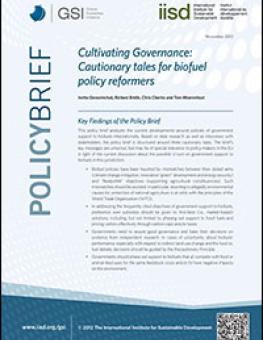
Cultivating Governance: Cautionary tales for biofuel policy reformers
The policy brief analyzes the current developments around the emerging U-turns on government support to biofuels internationally.
Based on desk research as well as interviews with stakeholders, the policy brief seeks to provide guidance for biofuel policy reformers on good governance principles in view of pressures from different interest groups.
The brief's key messages are universal, but may be of special relevance to policy-makers in the EU in light of the European Commission's proposal of October 17, 2012 to limit the use of food-based biofuels to 5 per cent until 2020 in contributing to the 10 per cent target of renewable energy in transport.
Key messages of the policy brief are:
Biofuel policies have been haunted by mismatches between their stated aims (climate change mitigation, innovative "green" development and energy security) and "Realpolitik" objectives (supporting agricultural constituencies). Such mismatches should be avoided. In particular, resorting to allegedly environmental causes for protection of national agriculture is at odds with the principles of the World Trade Organization (WTO).
In addressing the frequently cited objectives of government support to biofuels, preference over subsidies should be given to first-best (i.e., market-based) solutions, including, but not limited to, phasing out support to fossil fuels and pricing carbon effectively through carbon caps and/or taxes.
Governments need to assure good governance and base their decisions on evidence from independent research. In cases of uncertainty about biofuels' performance, especially with respect to indirect land use change and the food vs. fuel debate, decisions should be guided by the Precautionary Principle.
Governments should phase out support to biofuels that a) compete with food or animal-feed uses for the same feedstock crops and/or b) have negative impacts on the environment.
You might also be interested in
The Cost of Fossil Fuel Reliance
Government support for fossil fuels reached at least USD 1.5 trillion in 2023, new data shows.
Increased Support Needed to Achieve India's Clean Energy Goals
India is on track to achieve many of its 2030 clean energy goals but needs to step up government support measures to accelerate the deployment of offshore wind, electric vehicles, and green hydrogen, according to a new report.
Ending Export Credits for Oil and Gas: How OECD countries can end 2024 with a climate win
For a year now, Organisation of Petroleum Exporting Countries (OECD) governments have been negotiating an agreement that could put an end to oil and gas export finance. Following the acrimony in Baku, this would be a very real way for the OECD to show policy coherence, respond to calls from the poorest countries to stop subsidizing fossil fuels, and shift public finance to solutions.
Fossil Fuel Production, Renewable Energy, and Subsidy Reform in Nationally Determined Contributions 3.0
This policy brief provides an analysis of the critical benchmarks and recommendations necessary for aligning nationally determined contributions (NDCs) with the 1.5 °C target.